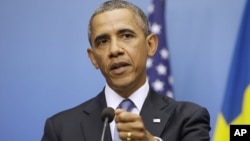President Barack Obama says the United States is consulting with European Union nations and other countries about clandestine American surveillance programs, to keep the spying from "tipping over to being too intrusive."
Obama acknowledged at a news conference in Stockholm, Sweden that technological advances have increased the chances for abuse.
"I'm the first one to acknowledge that given advances in technology and the fact that so much of our information flow today is through the Internet, through wireless that the risks of abuse are greater than they have been in the past."
The American leader, the first president to visit Sweden, said the focus of U.S. spying internationally was aimed at core U.S. national security interests, including counter-terrorism, controlling weapons of mass destruction and cybersecurity, and not spying on individuals unconnected to those concerns.
"I can give assurances to the publics in Europe and around the world that we're not going around snooping at people's emails or listening to their phone calls," Obama said. "What we try to do is to target very specifically areas of concern."
The extensive reach of secret U.S. surveillance programs being conducted by the country's National Security Agency became publicly known in recent months with disclosures by former American intelligence contractor Edward Snowden. He is now living in Russia in temporary asylum, with Russian President Vladimir Putin rejecting Obama's request to have him expelled to stand trial in the United States on espionage charges.
Obama acknowledged at a news conference in Stockholm, Sweden that technological advances have increased the chances for abuse.
"I'm the first one to acknowledge that given advances in technology and the fact that so much of our information flow today is through the Internet, through wireless that the risks of abuse are greater than they have been in the past."
The American leader, the first president to visit Sweden, said the focus of U.S. spying internationally was aimed at core U.S. national security interests, including counter-terrorism, controlling weapons of mass destruction and cybersecurity, and not spying on individuals unconnected to those concerns.
"I can give assurances to the publics in Europe and around the world that we're not going around snooping at people's emails or listening to their phone calls," Obama said. "What we try to do is to target very specifically areas of concern."
The extensive reach of secret U.S. surveillance programs being conducted by the country's National Security Agency became publicly known in recent months with disclosures by former American intelligence contractor Edward Snowden. He is now living in Russia in temporary asylum, with Russian President Vladimir Putin rejecting Obama's request to have him expelled to stand trial in the United States on espionage charges.





